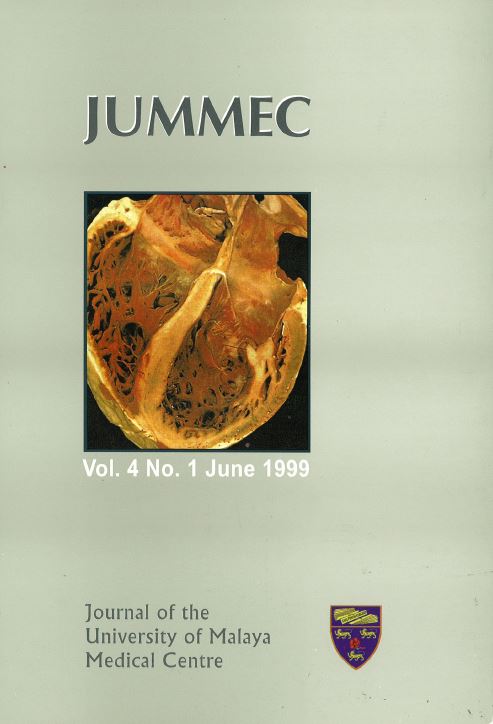Why are Nasopharyngeal Carcinoma Patients Diagnosed at Late Stage?
Abstract
100 consecutive newly diagnosed patients with nasopharyngeal carcinoma (NPC) since January 1994 were the subjects for studying various factors related to the delay in the confirmation of the diagnosis. 79 of them were males and the peak age of incidence was the 5th decade. 92% were Chinese, 7% Malay and 1% Indian. 76% were agriculture worker or labourers with 66% having either no formal education (16%) or only primary level education (50%). For 50% of patients neck swelling was the first
symptom, 26% had nasal symptoms, 12% ear symptoms and 11% had symptoms due to intracranial extension of tumour. As many as 80% were at UICC Stage IV at the time of diagnosis. Wliile the median delay, on the part of patients, in consulting a doctor was 2.5 days, the median delay on the part of the doctors to confirm the diagnosis of NPC was as long as 127 days, which was particularly worse when the patients presented with ear symptoms (266 days) followed by those with neck swelling (94 days). For those patients who were required to undergo more than one nasopharyngoscopy and biopsy the median doctor's delay was 144 days. Since 82% of patients had consulted general practitioners who remained the first-line healtl1~service provider, it is suggested that their level of awareness with regards to NPC be significantly raised so that the delay on their part be greatly minimized.
Downloads
Downloads
Published
Issue
Section
License
All authors agree that the article, if editorially accepted for publication, shall be licensed under the Creative Commons Attribution License 4.0 to allow others to freely access, copy and use research provided the author is correctly attributed, unless otherwise stated. All articles are available online without charge or other barriers to access. However, anyone wishing to reproduce large quantities of an article (250+) should inform the publisher. Any opinion expressed in the articles are those of the authors and do not reflect that of the University of Malaya, 50603 Kuala Lumpur, Malaysia.


